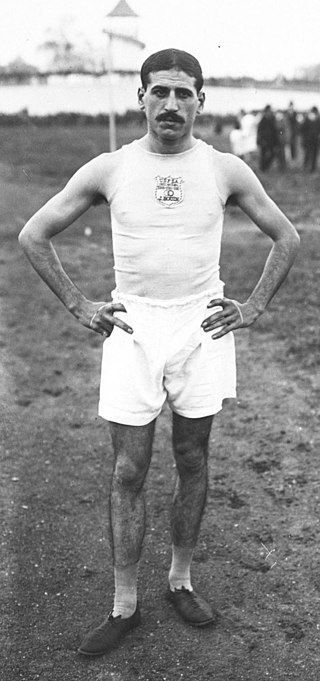Related Research Articles

James Davies Lightbody was an American middle distance runner, winner of six Olympic medals in the early 20th century.

Emilio Lunghi was an Italian athlete. He won the silver medal in the men's 800 metres race at the 1908 Summer Olympics in London, making him the first Italian to win an Olympic medal.

Norman Frederic Hallows was an English middle-distance runner. Educated at Felsted School, he won the bronze medal and set an Olympic record in the 1500 metres race at the 1908 Summer Olympics in London. His time in the first round was 4:03.4, beating the Olympic record set by American Mel Sheppard only minutes earlier by 1.6 seconds. In the final, Sheppard matched Hallows' first round time while Hallows finished in third place at 4:04.0.
Ernest Vincent Loney was a British athlete and member of the Birchfield Harriers athletics club. He competed at the 1908 Summer Olympics in London.

South Africa competed at the 1908 Summer Olympics in London, United Kingdom. At the time, South Africa consisted of four separate British colonies — the Cape Colony, Natal Colony, the Orange River Colony and the Transvaal Colony; they would form the Union of South Africa in 1910. At the 1908 Olympics, the South African team competed under a flag described as "the Red Ensign with a springbok in the corner."

Katherine Gwen Mudge was a British archer. She competed at the 1908 Summer Olympics in London. She was born in Llanbedr, Gwynedd in Wales. She was a member of the Devon and Cornwall Archery Society. Mudge competed at the 1908 Games in the only archery event open to women, the double National round. She took 17th place in the event with 465 points.
Gaspare Torretta was an Italian athlete who competed in the 1906 Summer Olympics and in the 1908 Summer Olympics.
Giuseppe Tarella was an Italian athlete. He competed at the 1908 Summer Olympics in London. He was born in Turin.
Frederick Meadows was a Canadian athlete. He competed in the 1908 Summer Olympics in London. In the 1500 metres, Meadows placed third in his initial semifinal heat with a time of 4:12.2. The heat was won by James P. Sullivan in 4:07.6.
Francis Arthur Knott was a British middle-distance running athlete. He competed in the 1908 Summer Olympics in London.
Joseph Michael Lynch was an Australian long-distance runner. Lynch was born in 1878 in Darlington, Sydney. He was the youngest son of Irish immigrants John Lynch and Mary Hassett.
Kjeld Nielsen was a Danish athlete. He competed in the 1908 Summer Olympics in London. In the 1500 metres event, Nielsen placed sixth in his initial semifinal heat and did not advance to the final. He also participated in the 5 miles race but was again eliminated in the first round.

Frank Nicholas Riley was an American athlete, and member of the Irish American Athletic Club. He was a member of the U.S. Olympic team in the 1908 Summer Olympics in London.
Charles Edward Swain was an Australian athlete. He competed in the 1908 Summer Olympics in London on the Australasia team, a combined squad of competitors from Australia and New Zealand.
Joseph Dreher was a French athlete. He competed at the 1908 Summer Olympics in London. In the 1500 metres, Dreher placed fifth and last in his initial semifinal heat and did not advance to the final.

Alexandre François Étienne Jean Bouin was a French middle-distance runner. He competed in the 1500m at the 1908 Olympics and the 5000m at the 1912 Olympics. He won a silver medal in the 5000m in 1912, behind Hannes Kolehmainen. His race against Kolehmainen has long been regarded as one of the most memorable moments in running. Kolehmainen and Bouin quickly pulled away from the others, with Bouin leading and Kolehmainen repeatedly trying to pass him. Kolehmainen succeeded only 20 metres from the finish, winning by 0.1 seconds. Both contenders broke the previous world record.
François Delloye was a Belgian athlete. He competed at the 1908 Summer Olympics in London. In the 1500 metres, Delloye placed fifth of seven in his initial semifinal heat and did not advance to the final. He also competed at the 1912 Summer Olympics in Stockholm.
E. Axel Andersson was a Swedish athlete. He competed at the 1908 Summer Olympics in London. In the 1500 metres, Andersson placed sixth of seven in his initial semifinal heat and did not advance to the final.
James Frances Fitzgerald was a Canadian athlete. He competed at the 1908 Summer Olympics in London. In the 1500 metres, Fitzgerald placed seventh and last in his initial semifinal heat and did not advance to the final.
Harvey Wright Cohn was an American track and field athlete and a member of the Irish American Athletic Club. A native of New York City, Cohn competed in the 1904 Summer Olympics, the 1906 Intercalated Games in Athens and 1908 Summer Olympics in London.
References
- ↑ "Arno Hesse". Olympedia. Retrieved 7 March 2021.